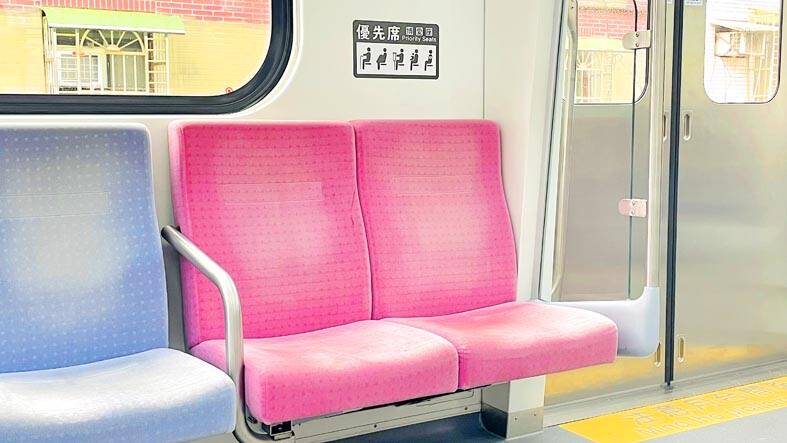Chinese-language signage on public transport nationwide is to be revised to better reflect inclusivity, following the passage of legislative amendments.
The changes, introduced late last month, would replace the term “courtesy seats” (博愛座) with “priority seats” (優先席). Additionally, signage specifying that seats are for “the disabled, elderly, women and children” would instead read “for those in genuine need.”
The amendments were approved in the third reading of revisions to Article 53-3 of the People with Disabilities Rights Protection Act (身心障礙者權益保障法), which governs access-friendly public transportation services.

Photo: Lin Chih-yi, Taipei Times
The article currently states that public transportation facilities without reserved seating “shall set aside courtesy seats for the disabled, elderly, women and children at a rate of no less than 15 percent of total seats available.”
Besides changing the Mandarin term, the amendments stipulate that priority seats can now also be used by “others with genuine need,” while the 15 percent ratio remained the same.
However, disability support groups said that simply renaming the seats is not enough, adding that public education is key to solving the issue of disputes on public transport.
Various badges could be introduced, they said, similar to the pregnancy badges issued to expectant mothers by the Taipei City Government.
Not all disabilities and special needs are visible, League for Persons with Disabilities secretary-general Hung Hsin-ping (洪心平) said, adding that, for example, young people undergoing chemotherapy or dialysis might need to use priority seating.
The amendments also introduce supplementary provisions requiring the Ministry of Transportation and Communications and the Ministry of Health and Welfare to standardize signage for priority seating across all public transportation systems, including buses, trains and mass rapid transit systems.
In addition, the ministries are tasked with launching public awareness campaigns and encouraging transport operators to promote understanding and empathy through onboard announcements and staff reminders.
The concept of “courtesy seats” is said to have originated from a United Daily News article published on April 2, 1976. The practice was first implemented by Taipei bus operators on 2,699 city buses to mark the first anniversary of former president Chiang Kai-shek’s (蔣介石) death, to commemorate his “benevolent spirit.”
The seats were later codified into law in 2013 under the People with Disabilities Rights Protection Act, which required 20 percent of seats on public transport to be designated as “courtesy” seats. That ratio was later reduced to 15 percent.
Additional reporting from CNA

A preclearance service to facilitate entry for people traveling to select airports in Japan would be available from Thursday next week to Feb. 25 at Taiwan Taoyuan International Airport, Taoyuan International Airport Corp (TIAC) said on Tuesday. The service was first made available to Taiwanese travelers throughout the winter vacation of 2024 and during the Lunar New Year holiday. In addition to flights to the Japanese cities of Hakodate, Asahikawa, Akita, Sendai, Niigata, Okayama, Takamatsu, Kumamoto and Kagoshima, the service would be available to travelers to Kobe and Oita. The service can be accessed by passengers of 15 flight routes operated by

Alain Robert, known as the "French Spider-Man," praised Alex Honnold as exceptionally well-prepared after the US climber completed a free solo ascent of Taipei 101 yesterday. Robert said Honnold's ascent of the 508m-tall skyscraper in just more than one-and-a-half hours without using safety ropes or equipment was a remarkable achievement. "This is my life," he said in an interview conducted in French, adding that he liked the feeling of being "on the edge of danger." The 63-year-old Frenchman climbed Taipei 101 using ropes in December 2004, taking about four hours to reach the top. On a one-to-10 scale of difficulty, Robert said Taipei 101

Taiwanese and US defense groups are collaborating to introduce deployable, semi-autonomous manufacturing systems for drones and components in a boost to the nation’s supply chain resilience. Taiwan’s G-Tech Optroelectronics Corp subsidiary GTOC and the US’ Aerkomm Inc on Friday announced an agreement with fellow US-based Firestorm Lab to adopt the latter’s xCell, a technology featuring 3D printers fitted in 6.1m container units. The systems enable aerial platforms and parts to be produced in high volumes from dispersed nodes capable of rapid redeployment, to minimize the risk of enemy strikes and to meet field requirements, they said. Firestorm chief technology officer Ian Muceus said

MORE FALL: An investigation into one of Xi’s key cronies, part of a broader ‘anti-corruption’ drive, indicates that he might have a deep distrust in the military, an expert said China’s latest military purge underscores systemic risks in its shift from collective leadership to sole rule under Chinese President Xi Jinping (習近平), and could disrupt its chain of command and military capabilities, a national security official said yesterday. If decisionmaking within the Chinese Communist Party has become “irrational” under one-man rule, the Taiwan Strait and the regional situation must be approached with extreme caution, given unforeseen risks, they added. The anonymous official made the remarks as China’s Central Military Commission Vice Chairman Zhang Youxia (張又俠) and Joint Staff Department Chief of Staff Liu Zhenli (劉振立) were reportedly being investigated for suspected “serious